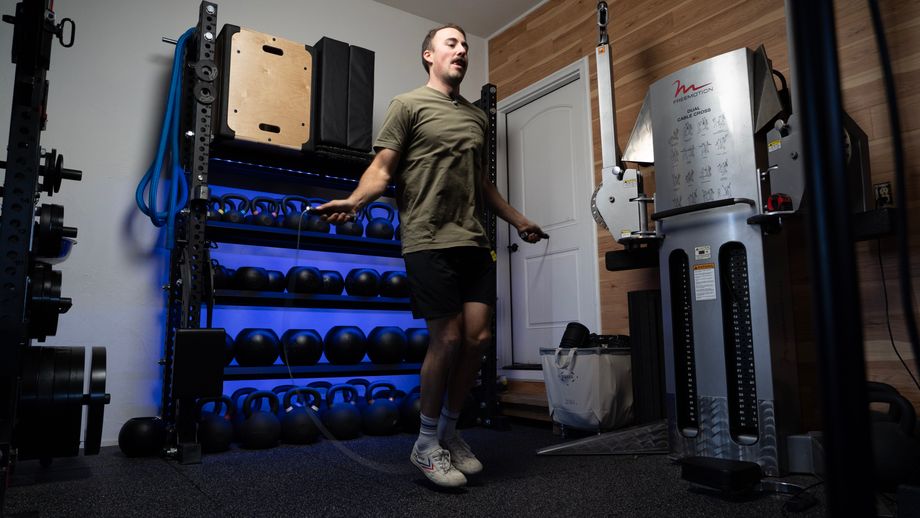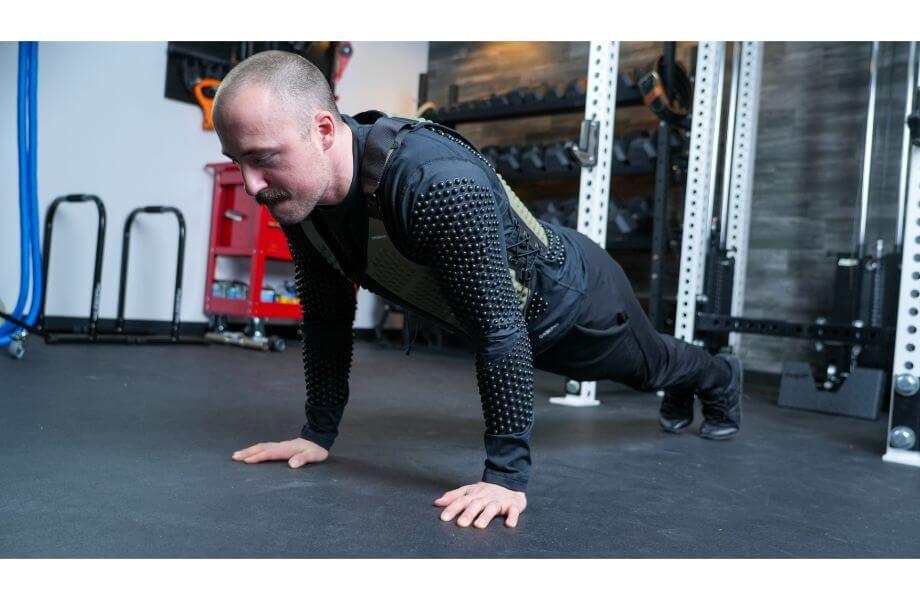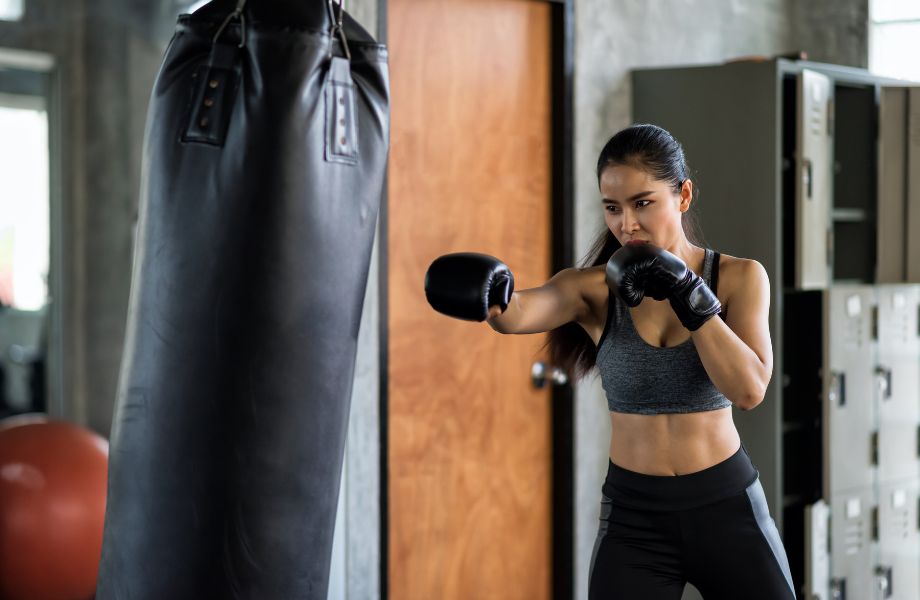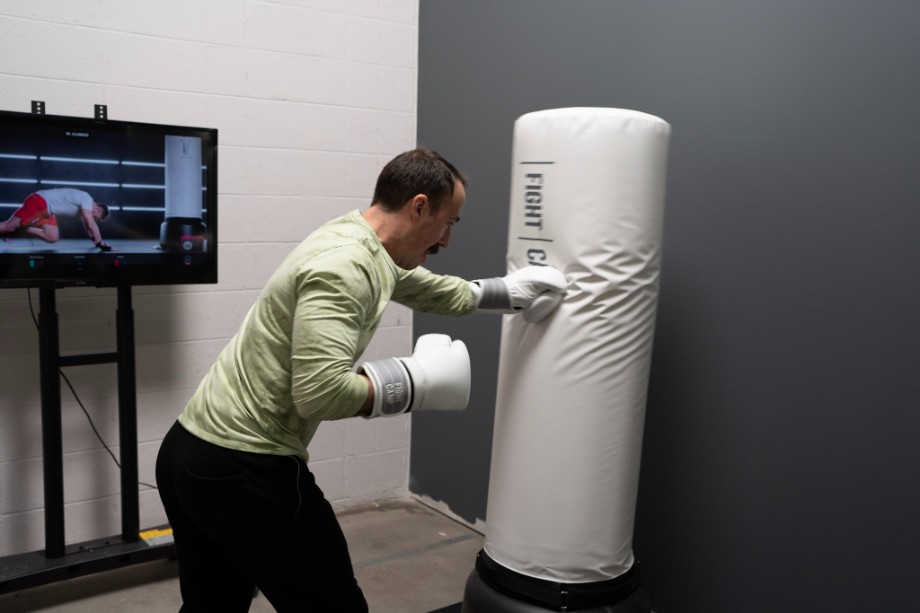We test and review fitness products based on an independent, multi-point methodology. If you use our links to purchase something, we may earn a commission. Read our disclosures.
Even if you have zero aspirations to square off against someone in the ring, you can still utilize boxing workouts as a way to get in shape. While they can be structured differently, they’re essentially a form of high-intensity interval training (HIIT) that involves everything from jumping jacks and jumping rope to throwing jabs and uppercuts to performing staple bodyweight exercises like push-ups, sit-ups, and burpees.
Although it won’t build strength like resistance training or be as simple as climbing the StairMaster or walking on the treadmill, boxing training offers a dynamic way to improve your endurance, hand-eye coordination, and self-confidence. However, if you’ve never stepped foot in a boxing gym or gone to an MMA or kickboxing class, you’re probably feeling a little lost about where to begin.
As a certified personal trainer (CPT) with an extensive athletic background, I can help put you on the path to more accurate, powerful punches and a leaner, stronger physique. I incorporated components of the best boxing workouts to create three dynamic training sessions that test your physical and mental toughness.
RELATED: Benefits of HIIT
Before you throw a single jab, I’m here to make sure you have exactly what you need to guarantee your at-home boxing workouts are a success.
What Equipment Do You Need for a Boxing Workout?
You’ll need a few important pieces of equipment to ensure a safe, effective boxing workout. Here’s a list of the gear you should consider adding to your garage gym to support your training:

- Boxing gloves: Typically made from synthetic or genuine leather, gloves help keep your hands and knuckles protected, as the padding reduces the impact from throwing or defending punches.
- Hand wraps: Boxers wear hand wraps under their gloves to secure and protect their wrists and knuckles. You must utilize proper wrapping technique to provide effective protection.
- Jump rope: A versatile conditioning tool that helps you develop precise footwork and cardiovascular fitness, jump ropes come in various materials, including leather, steel cable, and PVC. Lightweight speed ropes are specifically designed for faster rotations, making them an ideal choice if you want to improve your timing and coordination. Weighted jump ropes require more upper-body strength to spin.
- Heavy bag: The primary tool for practicing your punching technique and boxing combos, heavy bags come in a range of sizes, with most falling between 70 and 150 pounds. You can fill them with sand, water, grains, or other materials. You can also get a free-standing heavy bag or one that hangs from the ceiling.
- Speed bag: Made of leather and mounted on a swivel platform, a speed bag is the small, air-filled bag you sometimes see hanging up in an arcade or bar for testing your punching power. Its purpose is to help enhance hand-eye coordination, speed, and rhythm.
- Double-end bag: Anchored by elastic cords at both ends, a double-end bag can help you improve your accuracy and timing thanks to its unpredictable movement. Adding this to your arsenal can take your boxing workouts to the next level.
- Focus mitts: A necessity for partner boxing workouts, focus mitts are made from durable materials like leather or synthetic leather and feature extra padding to absorb plenty of punishment. A pair of high-quality mitts will provide your training partner with reliable targets to practice precisely thrown punches and boxing combos.
- Punching bag stand: A stand is necessary if you can’t mount a heavy bag to the ceiling. Some punching bag stands include attachments for speed or double-end bags.
- Protective gear: You’ll need headgear and a mouthguard for sparring sessions to minimize your risk of injury.
RELATED: Best Jump Rope
3 Boxing Workouts You Can Do At Home
Ready to unleash the beast (in a healthy way)? I designed each boxing workout session to address specific goals via a mix of punching bag workouts, bodyweight exercises, and dumbbell- or kettlebell-based movements.
Always start with warm-up exercises to prime your mind and body for action. After you’ve completed the workout, cool down for at least five to 10 minutes with a mix of static stretching and foam rolling.
Each workout allows you to practice your boxing stance and punching combos while testing your strength, stamina, and resolve. So, wrap your hands, lace up your gloves, and let’s hit it!
HIIT Boxing Workout
This HIIT workout includes a healthy mix of straight punches, crunches, and everything in between. Give everything you got during your work intervals and try to recover fully during your rest periods. You will perform all four sets of each exercise before moving on to the next one.

I made this beginner-friendly by going with a 1:1 work-to-rest ratio. If that’s too easy, cut your rest time in half. Just don’t be surprised if you struggle to stand by your final punch.
NOTE: You can perform the punching sequences against air (shadowboxing) or a heavy bag.
| Exercise | Sets | Time | Rest |
| Jump rope (warm-up) | 1 | 5 min. | N/A |
| High knees | 4 | 30 sec. | 30 sec. |
| Jab-Cross combo | 4 | 30 sec. | 30 sec. |
| Burpees | 4 | 30 sec. | 30 sec. |
| Uppercuts | 4 | 30 sec. | 30 sec. |
| Mountain climbers | 4 | 30 sec. | 30 sec. |
| Jab-Hook combo | 4 | 30 sec. | 30 sec. |
| Crunches | 4 | 30 sec. | 30 sec. |
| Cool-down stretch | 1 | 5 min. |
RELATED: HIIT Cardio Workouts at Home
Skill-Based Boxing Workout
This workout places less emphasis on metabolic conditioning and more on skill development. You will spend the majority of the session working on boxing combos on the heavy bag before finishing with speed bag and footwork drills.
| Exercise | Sets | Time | Rest |
| Jump rope (warm up) | 1 | 3 min. | N/A |
| Shadowboxing | 3 | 3 min. | 1-2 min. |
| Heavy bag work: | 4 | 3 min. | 1-2 min. |
| -Jab-Cross | 1 min. | ||
| -Hook combos | 1 min. | ||
| -Uppercut combos | 1 min. | ||
| Speed bag | 3 | 3 min. | 1-2 min. |
| Footwork drills | 3 | 3 min. | 1-2 min. |
| Cool-down stretching | 1 | 5 min. |
Strength and Skill Boxing Workout
This hybrid strength-and-skill session gives you the best of both worlds. In addition to bag work, you will complete a strength training circuit and finish with ab exercises for a true full-body experience.

NOTE: You will need a pair of dumbbells or a set of adjustable dumbbells to perform the strength component.
| Exercise | Sets | Time/Reps | Rest |
| Dynamic warm-up | 1 | 5 min. | N/A |
| Heavy bag work: | 3 | 3 min. | 1 min. |
| -Body shots | 1 min. | ||
| -Jab combos | 1 min. | ||
| -Hook combos | 1 min. | ||
| Strength training: circuit: | 3 | 1-2 min. | |
| –Goblet squat | 12-15 | ||
| –Dumbbell shoulder press | 10-12 | ||
| –Diamond push-up | 15-20 | ||
| –Weighted pull-up | 8-10 | ||
| Speed bag | 3 | 2 min. | 1 min. |
| Core work: | 3 | 1 min. | |
| -Plank | 30-45 sec. | ||
| –Side plank | 30-45 sec. | ||
| -Russian twist | 20, per side | ||
| Cool-down stretch | 1 | 5 min. |
RELATED: 12 Benefits of Strength Training
Benefits of Boxing Workouts
As a dedicated lifter for nearly two decades, I’ll be the first to admit that sticking to just strength training isn’t the most well-rounded approach to health and fitness. Cardio activities like boxing can provide benefits you may not always get from pumping iron.
Here’s what you can enjoy by penciling boxing workouts into your training program:
They Can Help Improve Your Cardiovascular Endurance
Anything you can do to increase both your aerobic and anaerobic metabolism will positively impact your health. Between the amount of movement and the intensity level, boxing workouts provide a direct path to developing better cardiovascular endurance. According to a 2015 study, boxing training (a form of HIIT) can elicit a better therapeutic effect on cardiovascular and obesity outcomes than an equivalent dose of brisk walking. Anyone who’s participated in a live or at-home boxing class will attest to how challenging it can be to catch your breath after a few minutes of shadowboxing, let alone a minute of heavy bag work.

Many sessions rely on HIIT principles, which involve high-intensity and low-intensity (or rest) intervals. This is a terrific way to increase your anaerobic fitness, and you can also include longer-duration, low-impact cardio workouts like jogging, rowing, or cycling to work on your aerobic capacity. Both forms of cardio will help you perform better in the squared circle and the gym.
RELATED: Benefits of Cardio
They Can Help Build Strength
While you won’t suddenly become a powerlifter by following boxing workouts, you can use them to develop strength and power. Heavy bag work forces you to refine your form and punching technique to deliver more impact with less wasted energy.
You can (and should) incorporate classic exercises like lunges, squats, presses, and pull-ups to enhance your muscular strength, which will have a positive carryover when it’s time to unleash your best boxing combos. This well-balanced approach will allow you to build a strong body and mind with every rep.
RELATED: 7 Types of Strength Training
They Engage Your Entire Body
Unlike a bro split workout, a boxing workout doesn’t isolate one muscle group or body part. On the contrary, it requires full-body engagement, as your lower body, core, and upper body must work synergistically.

For instance, shadowboxing involves throwing punches against the air. Your arms and shoulders must strike and recoil, your abdominal muscles must remain engaged (especially during rotational movements), and your legs must serve as a stable base that generates power.
RELATED: Full-Body Workout Vs Split
They Enhance Your Boxing Skills and Knowledge
Practice may never lead to perfection, but it will certainly lead to improvement. From growing comfortable with your stance to understanding the mechanics of a well-thrown cross, boxing workouts allow you to sharpen your skills and hone your knowledge about this mentally and physically demanding sport. Treat every training session as an opportunity to become more proficient at the technical aspects of boxing.
RELATED: Exercise and Mental Health
Boxing Workouts: Final Thoughts
Mike Tyson, Floyd Mayweather Jr., and Muhammad Ali didn’t become GOATs by accident. They all had natural skills that separated them from the average fighter, but they also dedicated endless hours of physical training to prepare their minds and bodies for battle.
While you may view boxing workouts as too intimidating or too technical, I’d encourage you to embrace learning a new skill. One of my favorite aspects of fitness is that you can always add another tool to your bag. You never know if a different type of workout may become your new favorite, so don’t pass on boxing until you’ve at least thrown a punch or two.
Boxing Workouts: FAQs
What workouts should I do for boxing?
Your workouts should include full-body strength training to enhance your muscular strength and power, shadowboxing, jumping rope, as well as running for cardio, and targeted ab work to develop a strong, stable core.
Does boxing build muscle?
While boxing engages multiple muscle groups, it doesn’t necessarily build muscle. However, it’s an excellent cardio workout that you can pair with a resistance training program to get leaner, stronger, and fitter.
Why is FightCamp one of the best boxing workouts for beginners?
FightCamp is an interactive, user-friendly smart home gym system with an intuitive app, clear instructions, and engaging workouts. It includes equipment like gloves and punch trackers that can help beginners learn how to box.
RELATED: FightCamp Review
How often should I train with a heavy bag for boxing?
The average person can train with a heavy bag two to three times a week to develop boxing skills and still have sufficient time to recover.
How do I structure a boxing workout for weight loss?
As a certified personal trainer, I recommend starting with a dynamic warm-up to increase blood flow, elevate your heart rate, and prime your muscles for action. A high-intensity interval training (HIIT) workout that includes a mix of skill development (shadowboxing or heavy bag work) and strength exercises will support your weight-loss efforts by helping you build muscle and burn fat.
References
- Cheema, B. S., Davies, T. B., Stewart, M., Papalia, S., & Atlantis, E. (2015). The feasibility and effectiveness of high-intensity boxing training versus moderate-intensity brisk walking in adults with abdominal obesity: a pilot study. BMC sports science, medicine & rehabilitation, 7, 3. https://doi.org/10.1186/2052-1847-7-3
Further reading

If you're expecting, you want the best for you and baby. That's why we're curated a list of the best protein powder for pregnancy, with a dietitian's stamp of approval. Read more

You’re stepping close to the one mile finish line but how many calories does walking a mile burn? Take a walk with us to find out! Read more

A pair of high-quality sneakers can make or break your training session. Who likes to stop mid-workout to adjust the tongue or laces of their shoes, or wiggle their foot around to achieve more comfort? Likewise, feeling like you’re gonna topple over during squats or scrape your shin due to a failed box jump is a major workout mood-killer.That’s why good training shoes are so important, and that’s why I recommend the Reebok Nano X1s for most people who do CrossFit. In my Reebok Nano X1 review, the Garage Gym Reviews team shares our experience with the newest Nanos available. Why You Should Trust UsI’ve been testing fitness equipment for years. And you know what I have to wear while testing all of the best home gym equipment? Shoes. Not only have I spent years buying and tryingworkout shoes to find my favorite pairs for different types of workouts, I actually created an entire roundup of thebest CrossFit shoes to help you find the perfect pair of sneaks, too. Read more

Need help understanding the different types of exercise bikes? Our detailed guide will help! Read more

